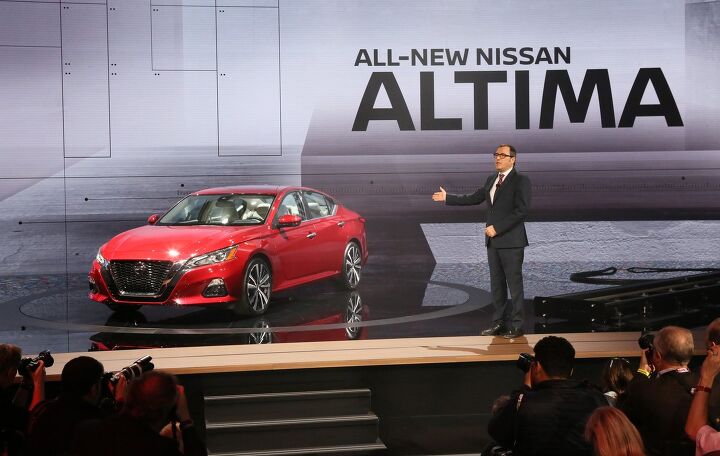AWD-only Nissan Altima, Not Surprisingly, Isn't Setting Sales Charts on Fire in Canada

The new-for-2019 Nissan Altima, arriving in the fall of 2018, marked a significant departure from the previous model. For starters, there was no V6 on offer; a turbocharged 2.0-liter four-cylinder engine with variable compression technology set up shop as the uplevel option. Also different was the appearance of all-wheel drive.
In Chris’ review of an attractive AWD Altima, he made note of Nissan’s enthusiasm for the technology, with the automaker’s U.S. brass claiming a significant take rate for Altimas with four driven wheels. That may be true in the U.S., but how does a traditionally front-drive model fare when it’s only available in AWD? Canada has the answer.
North of the border, the Altima is a very different beast. It’s only available with all-wheel-drive — even the lowly S — and the newly direct injected 2.5-liter base four is the only engine on offer. That serves to push the model’s entry price northward; a 2020 Altima S currently goes for $30,040 after destination and fees.
The current-gen Altima’s revamp and infusion of both technology and capability allowed Nissan’s midsize sedan to pull off a near-miraculous feat: it arrested the model’s sales decline in the United States. After peaking in 2014, the Altima saw consecutive yearly volume losses. Until 2019, that is. The the new model fully online, sales stabilized, with 2019 showing an extra 37 units on the sales ledger.
In Canada, with choice eliminated, not added, the opposite happened. Go figure! The model’s sales slide accelerated, with volume falling 35.8 percent (it isn’t known to what degree Nissan’s efforts to reduce fleet volume played a role). A year earlier, at the tail end of 2018, Altima sales had fallen 21.4 percent and 18 per cent in Canada and the U.S., respectively — a fairly similar decline.
Fast-forward to today and Canadian sales over the first two months of 2020 show no sign of renewed demand for the model; year-to-date sales in February were down 44.2 percent. The Altima finds itself outsold by the electric Leaf nearly 2 to 1.
Sometimes, increasing choice has a positive effect on a product’s popularity, though the new-for-2019 Mazda 3 is proof that this is not a hard and fast rule. While Altima sales in Canada are indeed down, the automaker is saving money through its pared-down build configurations. Meanwhile, the addition of standard AWD is almost certainly helping the model’s margin. Rapidly sinking sales numbers, however, are not a good omen for a model’s long-term survival.
[Image: Nissan]

More by Steph Willems
Latest Car Reviews
Read moreLatest Product Reviews
Read moreRecent Comments
- Ltcmgm78 Just what we need to do: add more EVs that require a charging station! We own a Volt. We charge at home. We bought the Volt off-lease. We're retired and can do all our daily errands without burning any gasoline. For us this works, but we no longer have a work commute.
- Michael S6 Given the choice between the Hornet R/T and the Alfa, I'd pick an Uber.
- Michael S6 Nissan seems to be doing well at the low end of the market with their small cars and cuv. Competitiveness evaporates as you move up to larger size cars and suvs.
- Cprescott As long as they infest their products with CVT's, there is no reason to buy their products. Nissan's execution of CVT's is lackluster on a good day - not dependable and bad in experience of use. The brand has become like Mitsubishi - will sell to anyone with a pulse to get financed.
- Lorenzo I'd like to believe, I want to believe, having had good FoMoCo vehicles - my aunt's old 1956 Fairlane, 1963 Falcon, 1968 Montego - but if Jim Farley is saying it, I can't believe it. It's been said that he goes with whatever the last person he talked to suggested. That's not the kind of guy you want running a $180 billion dollar company.


































Comments
Join the conversation
We need perspective here - Canadians do not buy midsized cars. Even the best seller - the Camry - only sells about 1,000 per month. (And probably 90% of those are taxis and rentals!). A 40% drop in Altima sales is only a few hundred cars. And can we stop with the poor Canadians buying only cheap cars? We buy more (overpriced) pickups than Americans on a per capital basis, so we’re just as willing to overspend on transportation as they are.
In several Canadian provinces, winter tires are mandatory so this may be having an impact on AWD car sales or simply Nissan cars are not the best and people are not buying them for that reason without big discounts.